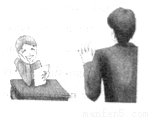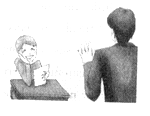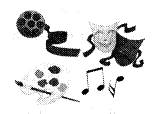
題目列表(包括答案和解析)
Going to a new school can be difficult, but this passage will help you in the beginning. Here is something to help you to fit in(融入).
First, take a day to enjoy your school. You won’t fit in at school if you don’t know the school. Ask for a school map. Try to get to know every corner of your new school. A good school handhook can be of great help. But to make it easy, ask the people near you where something is—tell people that you are new when you need help.

Be nice to everyone. Be nice to everyone, the young or the old, because they might just be your next teacher or friend.
Get to know your teachers and pay attention in class. Teachers always pay attention to(關(guān)注) new students, Talk to them and find out more about them. Never test their limits(底線(xiàn))—don’t go too far, or you may end up getting into trouhle(麻煩)
You need to make friends. Talk to different people. Be yourself and don’t lie. This is YOUR school now, take a chance(機(jī)會(huì)) on being who you weren’t at your old school. Join a few clubs or sports teams and make more friends in this way.

Be yourself and be polite. Don’t worry too much about what people think of you. Be true, be yourself, and be nice to everyone, no matter how mean(unfriendly) they may seem at first. It’s often the “girl/boy that I did’t like at my new school” that ends up being my friend after a little while. But then again, don’t be afraid to stand up for yourself if it’s very clear that you should.
Work hard to fit in while still being yourself. The first few weeks are always hard, but you’ll soon get used to it.
1.It is very easy to find places in your new school hy ____________.
A. looking at a map B. asking penple for help
C. reading a handbook D. walking around the school
2.The underlined phrase “stand up for yourself” means you should ________.
A. try to stand up all the time
B. be friendly to the mean persons
C. always do things by yourself
D. not change your idea if it’s right
3.The passage is mainly about ________________.
A. how to fit in when at a new school
B. how to make friends at a new school
C. how to enjoy the beauty of the school
D. how to be yourself at a new school


| A.looking at a map | B.a(chǎn)sking penple for help |
| C.reading a handbook | D. walking around the school |
| A.try to stand up all the time |
| B.be friendly to the mean persons |
| C.a(chǎn)lways do things by yourself |
| D.not change your idea if it’s right |
| A.how to fit in when at a new school |
| B.how to make friends at a new school |
| C.how to enjoy the beauty of the school |
| D.how to be yourself at a new school |
During my childhood in the 1960s, my parents were always busy with work and meetings. They left early in the morning and came back late in the evening. My sisters, my brother and I were left alone with Grandma. We saw our parents only on Sundays and during the few holidays. The only long period (一段)of time during which the whole family could be together once a year was the Spring Festival. We missed our parents badly, but didn’t say so because we had been told that hard work was everyone’s duty and that we could not have our own small family without a big family. Later I was a hard working student and, during summer or winter holidays, often stayed alone at university to have more time to study. I was always encouraged by my parents, for whom the holiday was less important than “work” and “study”. Holidays were a waste of time and I felt as if I had done something wrong if I took a holiday or did nothing during a holiday.
I spent the most difficult period of my life abroad. But when I joined this company, my boss didn’t seem to think it right for me to work like that. When I called him at home after office hours for business purposes (目的), he politely told me that he preferred talking about work with me in the office.
When the holiday season came near, he asked me to plan my leave beforehand (提前). He talked with me about his holiday and also asked about mine. For him, leave was a right. Giving up a holiday for the company is encouraged in China, but is foolish here. I began to think about holidays.
Today my parents are retired (退休)and stay home with a lot of time for their children. But we are all grown- up and live far away. We miss each other, but we cannot afford to see each other very much and they often feel sorry for the fact that they were too busy to be able to take care of us when we were young.
Nowadays, Chinese take long weekends and have paid holidays. But do they use their holidays to enjoy family life? I hope so because my experience in China and Europe has helped me understand that work is not my whole life and that a family is also very important. I do not want to feel sorry in the future as my parents do and I certainly spend as much time with my son as possible. There is nothing wrong with either working hard or taking holidays, but we shouldn’t have one instead of the other. It is important to keep a balance (平衡)between work and play.
1. What do the underlined words “paid leave” mean?
A. You have to pay when you take a holiday.
B. Someone will pay for your holiday.
C. You are still paid when you have your holiday.
D. You can’t leave until you pay for the holiday.
2. What is the main idea of this passage?
A. Working is the only part of the life.
B. Traveling is the best way to spend your holiday.
C. Enjoying holidays is as important as working
D. Sharing happiness with your family is more important
3. The writer talks about her own experience because she hopes that the Chinese will _______. A. plan their holiday beforehand B. get used to long holidays and enjoy themselves C. give up a holiday for their work D. bring business home after work hours
| A.two important ways to keep safe in cars | B.how air bags work to make cars safe |
| C.how seat belts work to make cars safe | D.why we must tie the egg to the skateboard |
| A.tell us that eggs are easy to break |
| B.show how to wear a seat belt |
| C.show why it's important to wear a seat belt in a car |
| D.tell us what a skateboard is |
| A.we are interested in them |
| B.they can stop us from hitting other cars |
| C.they can help us stay safely on the seats |
| D.they are made of strong materials |
| A.they are made of plastic |
| B.they can also help us to keep safe in a car |
| C.they can keep cars running slowly |
| D.they are put in front of and next to the seats |
| A.It won't be dangerous if there are seat belts or air bags in a car. |
| B.Now most of new cars still have only one air bag. |
| C.When a car hits something, its air bags will come out a few minutes later. |
| D.Volvo was the first to use seat belts. |
百度致信 - 練習(xí)冊(cè)列表 - 試題列表
湖北省互聯(lián)網(wǎng)違法和不良信息舉報(bào)平臺(tái) | 網(wǎng)上有害信息舉報(bào)專(zhuān)區(qū) | 電信詐騙舉報(bào)專(zhuān)區(qū) | 涉歷史虛無(wú)主義有害信息舉報(bào)專(zhuān)區(qū) | 涉企侵權(quán)舉報(bào)專(zhuān)區(qū)
違法和不良信息舉報(bào)電話(huà):027-86699610 舉報(bào)郵箱:58377363@163.com